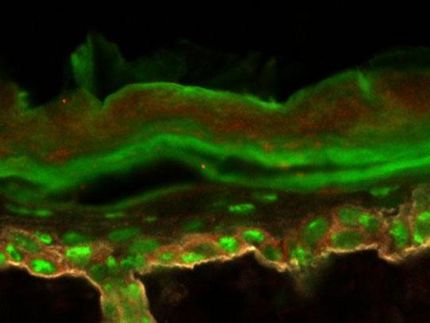To Prevent Cancer in Butterfly Disease Patients
How a rare genetic skin condition causes aggressive skin tumours
Fragile skin that blisters easily: 90 percent of the patients that suffer from the skin condition recessive dystrophic epidermolysis bullosa (RDEB) develop rapidly progressing cutaneous squamous cell carcinomas, a type of skin cancer, by the age of 55. 80 percent of these patients will die due to metastasis within five years after the cancer has been first detected. Researchers from the University of Freiburg and the University’s Medical Center have discovered how the two diseases are connected and which molecular mechanisms underlie the aggressive behaviour of squamous cell carcinomas in RDEB patients. Furthermore, the dermatologists and biologists found new potential targets for the development of drugs.

Cells of a cutaneous squamous cell carcinoma (green) that invade the skin.
Venugopal Rao Mittapalli
Epidermolysis Bullosa, also known as butterfly disease, is a genetic skin condition. The skin of patients with this disease is as fragile as the wings of a butterfly. It blisters easily in response to minor injury or friction such as rubbing or scratching. Furthermore, the patients develop chronic wounds that are not healing and their fingers and toes fuse, for example. The condition is caused by a mutation of the gene COL7A1, which contains the blueprint for the protein collagen VII. This protein helps to bind the epidermis and the dermis, two layers of the skin, together. In RDEB patient, collagen VII is completely absent and, therefore, the skin becomes fragile.
So far, little was known about the molecular mechanisms connecting squamous cell carcinomas and RDEB. The Freiburg research team discovered that the cancer progresses rapidly in RDEB patients, because the repeated mechanical injury alters the dermis. The amount of proteins called pro-fibrotic growth factors increases, thereby increasing stiffness of the dermis. This environment helps the tumour cells to spread.
The researchers have also identified mechanisms that could be potential drug targets. For example, molecules that inhibit the growth factor TGFβ reduce the stiffness and the spread of the RDEB cancer cells. “The new knowledge we have gained facilitates the design of prophylactic and therapeutic measures for delaying tumour progression and extending cancer-free periods in RDEB,” says Dr. Venugopal Rao Mittapalli from the Medical Center – University of Freiburg.
Original publication

Get the analytics and lab tech industry in your inbox
By submitting this form you agree that LUMITOS AG will send you the newsletter(s) selected above by email. Your data will not be passed on to third parties. Your data will be stored and processed in accordance with our data protection regulations. LUMITOS may contact you by email for the purpose of advertising or market and opinion surveys. You can revoke your consent at any time without giving reasons to LUMITOS AG, Ernst-Augustin-Str. 2, 12489 Berlin, Germany or by e-mail at revoke@lumitos.com with effect for the future. In addition, each email contains a link to unsubscribe from the corresponding newsletter.























































